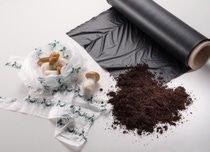Actualités & Médias
How ecovio® contributes to closing the nutrient cycle towards a Circular Economy
- Certified biodegradable plastics for mulch films, fruit and vegetable bags as well as organic waste bags add value for customers, end consumers and society
- Independent study by ETH Zürich proves for the first time the formation of biomass when PBAT biodegrades in soil
In the face of climate change and a growing human population the concept of a Circular Economy is becoming more and more important for the food and nutrient cycle. With the certified compostable plastic ecovio®, BASF has developed a material portfolio for a variety of applications which can be used throughout the entire food cycle. Now numerous studies by independent research institutions confirm the advantages of ecovio® for the production, packaging and transport as well as waste collection of food, based on the material’s certified biodegradability in industrial and home composting as well as in soil. The studies show: food waste is reduced, nutrients are returned to the soil by means of greater volumes of compost generated and the accumulation of plastics in soil is avoided.
Soil-biodegradable mulch films for sustainable agriculture
Thin polyethylene (PE) mulch films are used by farmers in many countries to increase crop yield. However, after harvesting it is often impossible for farmers to collect these films completely, especially when they are only a few micrometers thin. PE residues therefore find their way into the soil and accumulate there, since they do not break down. Now a study from ETH Zürich, Switzerland, has shown for the first time that soil microbes can use films made from the plastic polybutylene adipate terephthalate (PBAT) as food. The microorganisms use the carbon from the polymer both to generate energy and to form biomass. This means that PBAT biologically degrades in the soil and does not remain there as microplastic as PE does.
ecovio® M 2351 from BASF is a certified (EN 17033) soil-biodegradable plastic for mulch films, consisting of the biodegradable copolyester ecoflex® (PBAT) and other biodegradable polymers made from renewable raw materials. Films made from ecovio® M 2351 can be left in the soil after harvesting, rather than being laboriously removed and recycled. Naturally occurring microorganisms in the soil, such as bacteria or fungi, recognize the structure of an ecovio® M 2351 mulch film as food that they can metabolize. The remaining end products after biodegradation by microorganisms are CO2, water and biomass.
Avoiding food waste through intelligent packaging of fruit and vegetables Because of the breathability, fruit and vegetable bags made of ecovio® help food to stay fresh for a longer time. This is the result of a study by the University of Natural Resources and Applied Life Sciences, Vienna, Austria which measured the shelf life of different types of fruit and vegetables stored in bags made of PE and of ecovio®. Fruit and vegetable bags made of ecovio® show better water vapor and oxygen transmission rates: This leads to an optimal humidity and oxygen concentration for different fruit and vegetables in a bag with the right volume. This in turn results in a longer shelf life: For example, tomatoes can be stored for up to four times longer in ecovio® bags than in PE bags. In this way, intelligent packaging can reduce food waste. In addition, fruit and vegetable bags made from ecovio® are not just carrier and storage bags: reused as organic waste bags, they can improve the collection and recovery of food waste.
Clean, safe and easy: collecting more organic waste with compostable dual- use bags
The separate collection of organic waste is the prerequisite for the recovery of nutrients and hence a closed nutrient cycle. A number of pilot projects, e.g. in Berlin and in the district of Bad Dürkheim, Germany, but also in India and China, have shown that consumers collect significantly more organic waste with compostable plastic bags when they have easy access to the bags. Consumers then also collect food waste they would not ordinarily collect, such as oily, liquid food residues. In addition, the number of non-compostable bags thrown in the organic waste bin drops significantly.
Compostable dual-use bags made from ecovio® enable larger amounts of kitchen waste to be collected for organic recovery in a clean, safe and easy way – and without sodden bags and unpleasant odors, since ecovio® is tear and wet resistant. Under the conditions of an industrial composting plant, ecovio® is fully biodegraded by microorganisms and their enzymes within a few weeks (as defined by EN 13432). The valuable compost can subsequently be used to increase the nutrient density in the soil, thus closing the nutrient cycle.
For more information, please visit: www.biopolymers.basf.com
Receive the latest press releases from BASF via WhatsApp on your smartphone or tablet. Register for our news service at basf.com/whatsapp-news.
About BASF’s Performance Materials division
BASF’s Performance Materials division encompasses the entire materials’ know-how of BASF regarding innovative, customized plastics under one roof. Globally active in four major industry sectors – transportation, construction, industrial applications and consumer goods – the division has a strong portfolio of products and services combined with a deep understanding of application- oriented system solutions. Key drivers of profitability and growth are our close collaboration with customers and a clear focus on solutions. Strong capabilities in R&D provide the basis to develop innovative products and applications. In 2018, the Performance Materials division achieved global sales of €7.65 bn. More information online: www.plastics.basf.com.
About BASF
At BASF, we create chemistry for a sustainable future. We combine economic success with environmental protection and social responsibility. The approximately 122,000 employees in the BASF Group work on contributing to the success of our customers in nearly all sectors and almost every country in the world. Our portfolio is organized into six segments: Chemicals, Materials, Industrial Solutions, Surface Technologies, Nutrition & Care and Agricultural Solutions. BASF generated sales of around €63 billion in 2018. BASF shares are traded on the stock exchange in Frankfurt (BAS) and as American Depositary Receipts (BASFY) in the U.S. Further information at www.basf.com.
P-19-253


